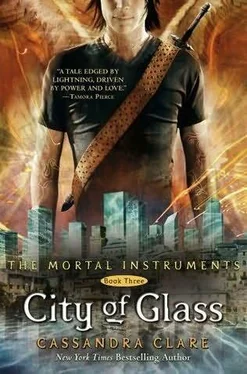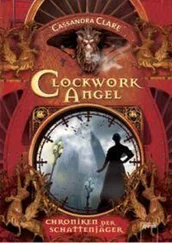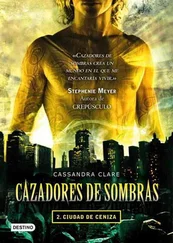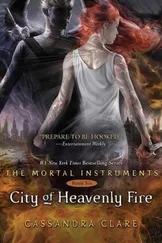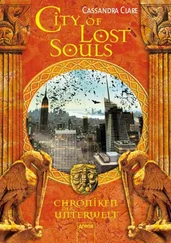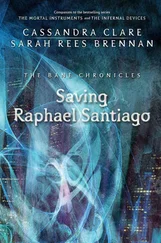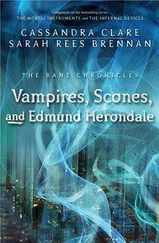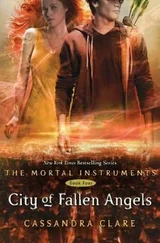By late afternoon Luke and Clary had left the lake far behind and were pacing over seemingly endless broad, flat swatches of high grass. Here and there a gentle rise reared up into a high hill topped with black rocks. Clary was exhausted from staggering up and down the hills, one after another, her boots slipping on the damp grass as if it were greased marble. By the time they left the fields behind for a narrow dirt road, her hands were bleeding and grass-stained.
Luke stalked ahead of her with determined strides. Occasionally he would point out items of interest in a somber voice, like the world’s most depressed tour guide. “We just crossed Brocelind Plain,” he said as they climbed a rise and saw a tangled expanse of dark trees stretching away toward the west, where the sun hung low in the sky. “This is the forest. The woods used to cover most of the lowland of the country. Much of it was cut down to make way for the city—and to clear out the wolf packs and vampire nests that tended to crop up there. Brocelind Forest has always been a hiding place for Downworlders.”
They trudged along in silence as the road curved alongside the forest for several miles before taking an abrupt turn. The trees seemed to lift away as a ridge rose above them, and Clary blinked when they turned the corner of a high hill—unless her eyes were deceiving her, there were houses down there. Small, white rows of houses, orderly as a Munchkin village. “We’re here!” she exclaimed, and darted forward, only stopping when she realized that Luke was no longer beside her.
She turned and saw him standing in the middle of the dusty road, shaking his head. “No,” he said, moving to catch up with her. “That’s not the city.”
“Then is it a town? You said there weren’t any towns near here—”
“It’s a graveyard. It’s Alicante’s City of Bones. Did you think the City of Bones was the only resting place we had?” He sounded sad. “This is the necropolis, the place we bury those who die in Idris. You’ll see. We have to walk through it to get to Alicante.”
Clary hadn’t been to a graveyard since the night Simon had died, and the memory gave her a bone-deep shiver as she passed along the narrow lanes that threaded among the mausoleums like white ribbon. Someone took care of this place: The marble gleamed as if freshly scrubbed, and the grass was evenly cut. There were bunches of white flowers laid here and there on the graves; she thought at first they were lilies, but they had a spicy, unfamiliar scent that made her wonder if they were native to Idris. Each tomb looked like a little house; some even had metal or wire gates, and the names of Shadowhunter families were carved over the doors. CARTWRIGHT. MERRYWEATHER. HIGHTOWER. BLACKWELL. MIDWINTER. She stopped at one: HERONDALE.
She turned to look at Luke. “That was the Inquisitor’s name.”
“This is her family tomb. Look.” He pointed. Beside the door were white letters cut into the gray marble. They were names. MARCUS HERONDALE. STEPHEN HERONDALE. They had both died in the same year. Much as Clary had hated the Inquisitor, she felt something twist inside her, a pity she couldn’t help. To lose your husband and your son, so close together…Three words in Latin ran under Stephen’s name: AVE ATQUE VALE.
“What does that mean?” she asked, turning to Luke.
“It means ‘Hail and farewell.’ It’s from a poem by Catullus. At some point it became what the Nephilim say during funerals, or when someone dies in battle. Now come on—it’s better not to dwell on this stuff, Clary.” Luke took her shoulder and moved her gently away from the tomb.
Maybe he was right, Clary thought. Maybe it was better not to think too much about death and dying right now. She kept her eyes averted as they made their way out of the necropolis. They were almost through the iron gates at the far end when she spotted a smaller mausoleum, growing like a white toadstool in the shadow of a leafy oak tree. The name above the door leaped out at her as if it had been written in lights.
FAIRCHILD.
“Clary—” Luke reached for her, but she was already gone. With a sigh he followed her into the tree’s shadow, where she stood transfixed, reading the names of the grandparents and great-grandparents she had never even known she had. ALOYSIUS FAIRCHILD. ADELE FAIRCHILD, B. NIGHTSHADE. GRANVILLE FAIRCHILD. And below all those names: JOCELYN MORGENSTERN, B. FAIRCHILD.
A wave of cold went over Clary. Seeing her mother’s name there was like revisiting the nightmares she had sometimes where she was at her mother’s funeral and no one would tell her what had happened or how her mother had died.
“But she’s not dead,” she said, looking up at Luke. “She’s not—”
“The Clave didn’t know that,” he told her gently.
Clary gasped. She could no longer hear Luke’s voice or see him standing in front of her. Before her rose a jagged hillside, gravestones protruding from the dirt like snapped-off bones. A black headstone loomed up in front of her, letters cut unevenly into its face: CLARISSA MORGENSTERN, B. 1991 D. 2007. Under the words was a crudely drawn child’s sketch of a skull with gaping eye sockets. Clary staggered backward with a scream.
Luke caught her by the shoulders. “Clary, what is it? What’s wrong?”
She pointed. “There—look—”
But it was gone. The grass stretched out ahead of her, green and even, the white mausoleums neat and plain in their orderly rows.
She twisted to look up at him. “I saw my own gravestone,” she said. “It said I was going to die—now—this year.” She shuddered.
Luke looked grim. “It’s the lake water,” he said. “You’re starting to hallucinate. Come on—we haven’t got much time left.”
Jace marched Simon upstairs and down a short hallway lined with doors; he paused only to straight-arm one of them open, a scowl on his face. “In here,” he said, half-shoving Simon through the doorway. Simon saw what looked like a library inside: rows of bookshelves, long couches, and armchairs. “We should have some privacy—”
He broke off as a figure rose nervously from one of the armchairs. It was a little boy with brown hair and glasses. He had a small, serious face, and there was a book clutched in one of his hands. Simon was familiar enough with Clary’s reading habits to recognize it as a manga volume even at a distance.
Jace frowned. “Sorry, Max. We need the room. Grown-up talk.”
“But Izzy and Alec already kicked me out of the living room so they could have grown-up talk,” Max complained. “Where am I supposed to go?”
Jace shrugged. “Your room?” He jerked a thumb toward the door. “Time to do your duty for your country, kiddo. Scram.”
Looking aggrieved, Max stalked past them both, his book clutched to his chest. Simon felt a twinge of sympathy—it sucked to be old enough to want to know what was going on, but so young you were always dismissed. The boy shot him a look as he went past—a scared, suspicious glance. That’s the vampire, his eyes said.
“Come on.” Jace hustled Simon into the room, shutting and locking the door behind them. With the door closed the room was so dimly lit even Simon found it dark. It smelled like dust. Jace walked across the floor and threw open the curtains at the far end of the room, revealing a tall, single-paned picture window that gave out onto a view of the canal just outside. Water splashed against the side of the house just a few feet below them, under stone railings carved with a weather-beaten design of runes and stars.
Jace turned to Simon with a scowl. “What the hell is your problem, vampire?”
“ My problem? You’re the one who practically dragged me out of there by my hair.”
Читать дальше
